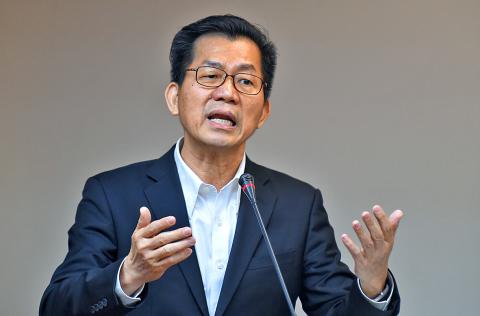The government does not have regulations to prohibit Asia Cement Corp (亞洲水泥) from mining in Hualien County, including its 25 hectares of quarry within the boundaries of Taroko National Park, the Ministry of Economic Affairs (MOEA) said yesterday.
The ministry’s remarks came after Environmental Protection Administration Minister Lee Ying-yuan (李應元) on Wednesday said the company would have to end its operations in Taroko National Park next year when its license for that quarry expires.
Lee said the move would be part of his agency’s efforts to ban mining in national parks.

Photo: Liu Hsin-de, Taipei Times
The government in 1977 granted Asia Cement, Taiwan’s second-largest cement maker, a 20-year license to mine in 442.7 hectares in the county as part of plans to develop eastern Taiwan in the 1970s, Bureau of Mines Director-General Chu Ming-chau (朱明昭) yesterday told a news conference in Taipei.
Taroko National Park was established in 1986, and 25 hectares of the park overlapped with Asia Cement’s quarry, Chu said.
Although the government allowed Asia Cement to continue mining on the 25 hectares, the company inked a memorandum with the park administration that it would not extend its operations after its mining license expires on Nov. 22 next year, Chu said.
“Actually, Asia Cement stopped mining in the park a while ago… It is now helping the park restore the environment of the 25 hectares,” Chu said.
Given that Asia Cement’s operational and production efficiency in Hualien follows ministry standards, and a mining license extension does not require another environmental impact assessment, there would be no reason for the ministry to reject an application by the company to extend its mining license on the land outside of the park.
“Unless the EPA asks the economics ministry to expand the area of the no-mining zone around Taroko National Park, and in that case we would need to review the feasibility,” Chu added in a telephone interview.
However, if the government really wants to stop Asia Cement from operating outside of the park, it is going to have to compensate the company for any potential losses, Chu said, adding such a move would impact the firm’s downstream suppliers in eastern Taiwan and more than 1,000 employees, he said.
EPA officials are to discuss more details of the agency’s plans with the ministry soon, Chu said.

SECURITY: As China is ‘reshaping’ Hong Kong’s population, Taiwan must raise the eligibility threshold for applications from Hong Kongers, Chiu Chui-cheng said When Hong Kong and Macau citizens apply for residency in Taiwan, it would be under a new category that includes a “national security observation period,” Mainland Affairs Council (MAC) Minister Chiu Chui-cheng (邱垂正) said yesterday. President William Lai (賴清德) on March 13 announced 17 strategies to counter China’s aggression toward Taiwan, including incorporating national security considerations into the review process for residency applications from Hong Kong and Macau citizens. The situation in Hong Kong is constantly changing, Chiu said to media yesterday on the sidelines of the Taipei Technology Run hosted by the Taipei Neihu Technology Park Development Association. With

A US Marine Corps regiment equipped with Naval Strike Missiles (NSM) is set to participate in the upcoming Balikatan 25 exercise in the Luzon Strait, marking the system’s first-ever deployment in the Philippines. US and Philippine officials have separately confirmed that the Navy Marine Expeditionary Ship Interdiction System (NMESIS) — the mobile launch platform for the Naval Strike Missile — would take part in the joint exercise. The missiles are being deployed to “a strategic first island chain chokepoint” in the waters between Taiwan proper and the Philippines, US-based Naval News reported. “The Luzon Strait and Bashi Channel represent a critical access

‘FORM OF PROTEST’: The German Institute Taipei said it was ‘shocked’ to see Nazi symbolism used in connection with political aims as it condemned the incident Sung Chien-liang (宋建樑), who led efforts to recall Democratic Progressive Party (DPP) Legislator Lee Kun-cheng (李坤城), was released on bail of NT$80,000 yesterday amid an outcry over a Nazi armband he wore to questioning the night before. Sung arrived at the New Taipei City District Prosecutors’ Office for questioning in a recall petition forgery case on Tuesday night wearing a red armband bearing a swastika, carrying a copy of Adolf Hitler’s Mein Kampf and giving a Nazi salute. Sung left the building at 1:15am without the armband and apparently covering the book with a coat. This is a serious international scandal and Chinese

COUNTERINTELLIGENCE TRAINING: The ministry said 87.5 percent of the apprehended Chinese agents were reported by service members they tried to lure into becoming spies Taiwanese organized crime, illegal money lenders, temples and civic groups are complicit in Beijing’s infiltration of the armed forces, the Ministry of National Defense (MND) said in a report yesterday. Retired service members who had been turned to Beijing’s cause mainly relied on those channels to infiltrate the Taiwanese military, according to the report to be submitted to lawmakers ahead of tomorrow’s hearing on Chinese espionage in the military. Chinese intelligence typically used blackmail, Internet-based communications, bribery or debts to loan sharks to leverage active service personnel to do its bidding, it said. China’s main goals are to collect intelligence, and develop a